Guo Fan: Golden Days of Chinese Science Fiction
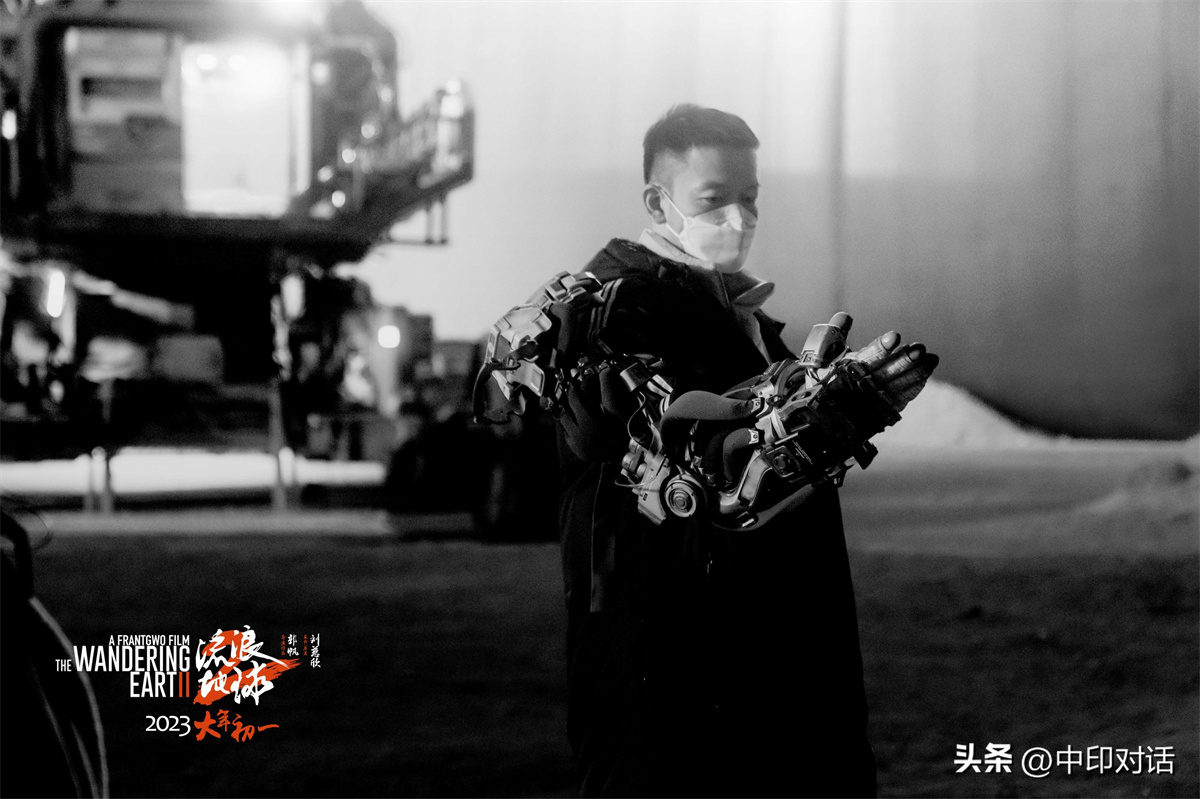
“While the first of the Wandering Earth series ushered in a magnificent journey for Chinese sci-fi films, the second one represented its arrival on the international stage,” declared Liu Cixin, author of the original novel The Wandering Earth, after watching The Wandering Earth II, which hit cinemas on January 22 this year.
After its release in North America as well as countries like Britain and Ireland, The Wandering Earth II performed well at the box office based on strong word of mouth. As of February 18, the film was rated 8.0 score on Internet Movie Database (IMDb). On Rotten Tomatoes, an American film review compilation website, 80 percent of reviews of the movie were positive, and the audience rating had reached 97 percent.
When the box office of The Wandering Earth II reached 3.7 billion yuan (about US$528 million) by February 14, it brought the total earnings of films directed by Guo Fan past 10 billion yuan (about US$1.4 billion).
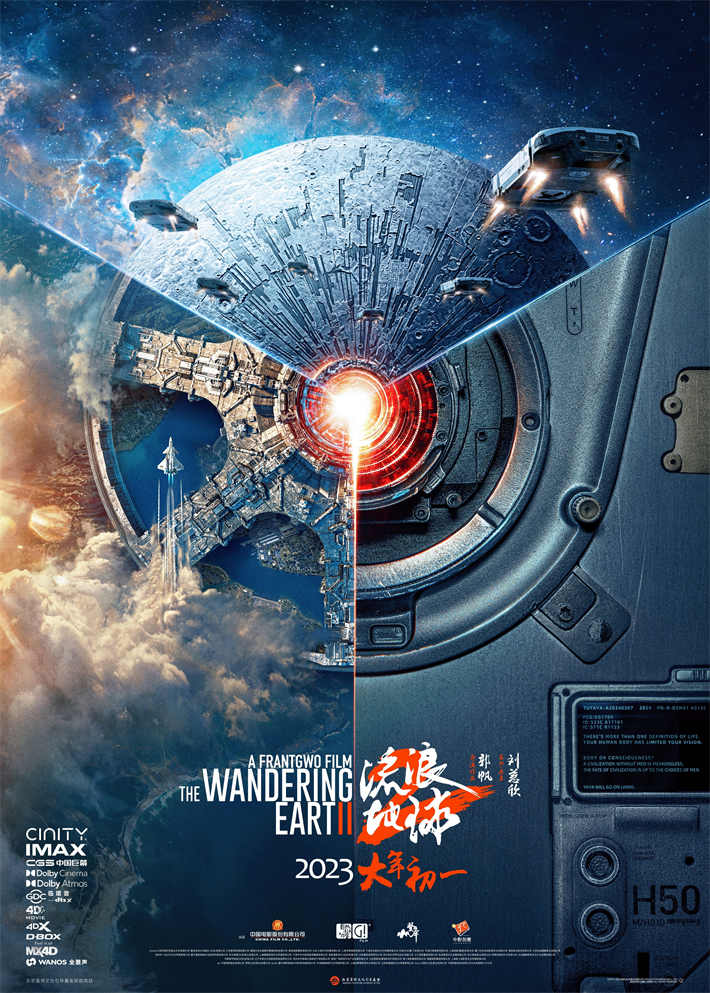
A poster for The Wandering Earth II. The much-anticipated sci-fi blockbuster displays an impressive visual effect upgrade over its predecessor.
Spirit of Chinese Science Fiction
The Wandering Earth’s release during Spring Festival made 2019 considered the “first year of Chinese sci-fi film.” Following the concept of “wandering with Earth” from the original work, the film veers away from the basic plot of building “Noah’s Ark” and humans abandoning Earth and exploring and migrating to other planets like past sci-fi disaster films. Nor does this film create a superhero. Instead, it depicts a number of rescue teams totally composed of 1.5 million people from different countries, reflecting the Chinese-style heroism of “a community with a shared future for mankind.” It pioneers the genre by constructing a sci-fi world with a core of traditional Chinese culture.
The Wandering Earth II, released four years later, further enriched the spirit of Chinese-style science fiction. Laid out as a prequel to The Wandering Earth, the second installment tells the story of mankind’s choice and final implementation of the “Wandering Earth Project” proposed by the Chinese government to avert a doomsday disaster.
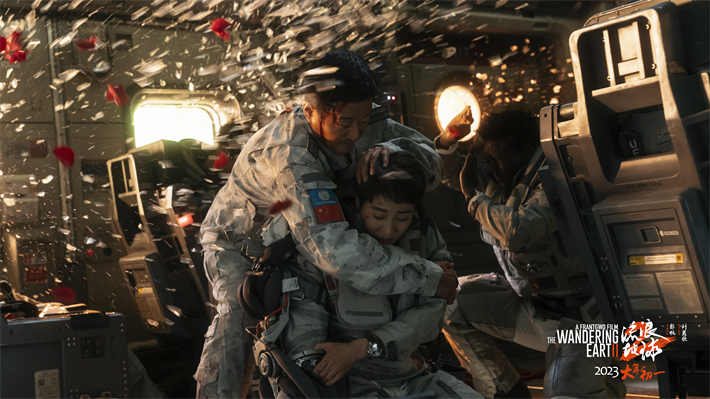
A still from The Wandering Earth II. Depiction of the bonds between Chinese scientist Tu Hengyu and his daughter Tu Yaya and between Chinese astronaut Liu Peiqiang and his wife Han Duoduo in the film is moving.
“While The Wandering Earth is more of an outward exploration of humans taking off alongside Earth, I wanted to dig the story of The Wandering Earth II in the inner direction,” noted Guo Fan, director of both films. The inward development of The Wandering Earth II results in richer images of characters and more delicate feelings of humans. It maintains the storyline of major character Liu Peiqiang (played by Wu Jing) in the first film, who leaves the opportunity to survive to his son Liu Qi and his father-in-law Han Zi’ang in the face of the disaster, a subtle and delicate tale of a Chinese astronaut selflessly sacrificing himself for the greater good. The Wandering Earth II also added two storylines represented by Chinese scientist Tu Hengyu (played by Andy Lau) and the Chinese representative to the United Earth Government (UEG) Zhou Zhezhi (played by Li Xuejian). The former introduces the concept of “digital life,” exploring the ethical relationship among people, digital people, and artificial intelligence, which increases the depth and futuristic sense of the film. The latter reflects the Chinese courage to take on responsibility in the face of crisis.
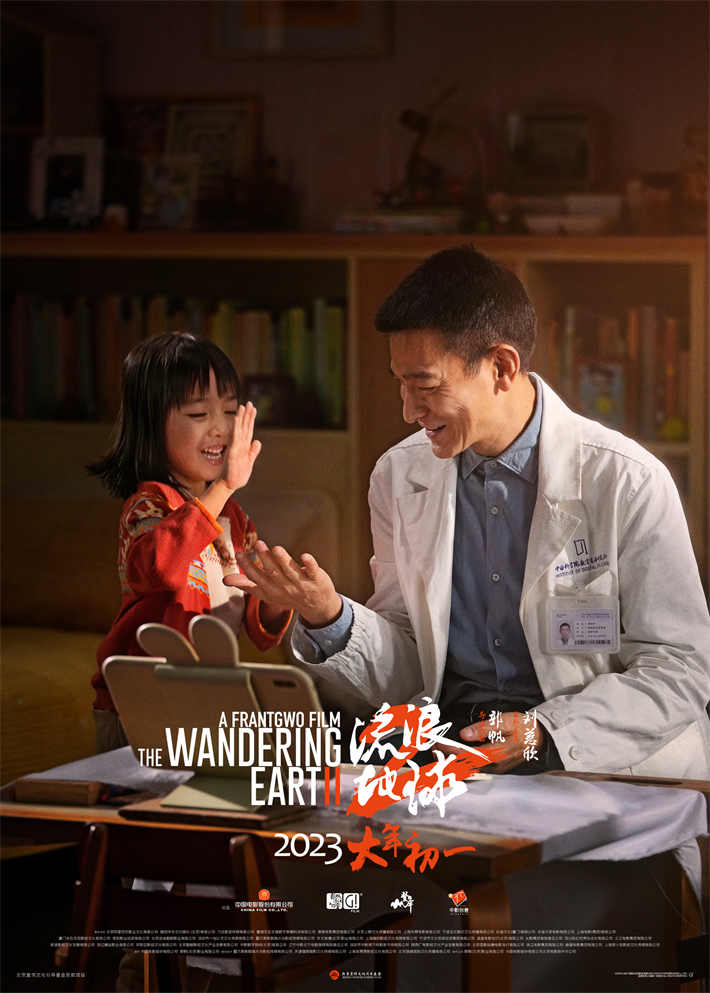
A still from The Wandering Earth II.
Famous Chinese musician Liu Huan composed theme songs for both Wandering Earth films. While the song “Take the Earth to Wander” from four years ago expressed the deep Chinese love for Earth, the more recent “I’m Here” celebrated the deepest family bond of human beings. “I am here, I have always been there, and I am guarding that moment you are in front of me...” Through the adaptation of the last sentence of Liu Cixin’s original work, the musician blended China’s traditional idea of integration of family and motherland with the Chinese people’s values and thirst for family affection since the outbreak of the COVID-19 epidemic, which ended up one of the most touching moments in the film.
Documentary of the Future
After watching The Wandering Earth, Liu Cixin told Guo Fan that the ideal appearance of science fiction in his mind should be like a documentary of future history to make it more meaningful. “When shooting the second film, we tried to produce a ‘documentary of the future,’ which was an important goal this time,” Guo Fan said.
To make the details of the film as authentic and rich as a documentary, Guo invited more than 20 scientists from institutions including the Chinese Academy of Sciences to serve as advisors for film production. Many cutting-edge technologies depicted in The Wandering Earth II are based on real developments. And the more imaginative scenes were carefully arranged one by one. Viewers were shocked by a space elevator stretching hundreds of kilometers from Earth to space and a giant space station falling from the sky with a massive ocean splash.

A kind of armed drones named Predator in the film The Wandering Earth II can take off and land vertically, fly very fast, and attack in groups like wasps.
Moreover, the film introduced fundamental changes in art settings and props production. The impressive planetary propellers in the previous film were optimized in all aspects with amazing details and a more magnificent appearance. The improved spacesuit designed and produced by the prop team appeared more realistic. Combined, such details create a vivid and credible world for a sci-fi narrative.
Guo Fan suggested that realization of imagination in the film is closely related to the country’s real economy and industry. He noted that many of the transformable engineering machines used by the UEG in The Wandering Earth II was made by Xuzhou Construction Machinery Group, a leading Chinese producer of construction machinery. “In addition to heavy machinery, we also excel at producing delicate and precise electronic devices,” said Guo.
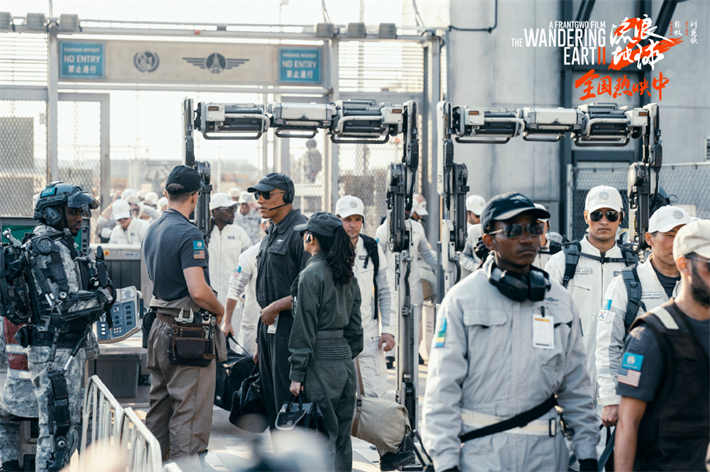
A still from The Wandering Earth II. In the film, the Gabon Experimental Base of the United Earth Government jointly founded by countries around the world is located in the African country’s capital city of Libreville.
As a sci-fi fan as well as a film director, Guo Fan knows how unique sci-fi films are and believes they can only be as strong as the country supporting them. “China’s technological advancements and growing national strength have given us more confidence to shoot sci-fi films,” he said. “The best days of Chinese sci-fi films are likely right around the corner.”